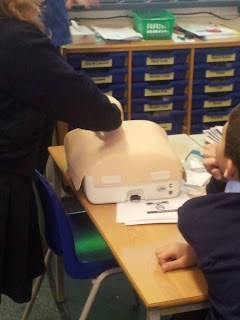Our Second Visitor
We were lucky enough to recieve a visit from an Accident and Emergency nurse who gave a powerful and engaging workshop and mini lecture on the impact of writing in his occupation.
Andy introduced the children to shorthand methods of writing in the medical profession and the importance of neat handwriting!
Of course there was room for a bit of gore!!
Children had the chance to learn how to tie a sling as well as perform CPR on a real-life resuscitation doll, the class thoroughly enjoyed this opportunity to learn a life skill via the infamous 'Mini Vinnie' ad campaign.
Andy stressed the importance of vocabulary knowledge when working within medicine, this thought was continued by a challenge sheet provided for the class to complete at home.
At the end of the session the children were really enthused to discover new words, particularly ones that were hard to pronounce! After all the gore and new life skills we really felt the message that writers are all around us in a variety of contexts really came across to the children. They have begun to realise that writing is not just a school-based activity but a rich and important communicative form that they will encounter throughout their lives and future careers.








.jpeg)
